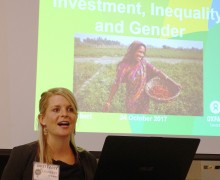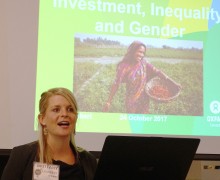Impact investors urged to consider impact over maximum returns

Brittany Lambert speaks to Oikocredit investors and supporters
The Womens' Policy Specialist for Oxfam Canada appeals to put impact first.
Investors should consider adequate rather than maximized returns for impact investments, says Brittany Lambert, Women’s Rights Policy and Advocacy Specialist for Oxfam Canada.
Lambert made the comments in a presentation Oct. 24 in Toronto at an event hosted by Oikocredit Canada entitled Investment, Inequality and Gender. In her presentation, she argued that impact investors have moved in recent years from seeking social and environmental benefits while preserving capital to chasing maximum returns while hoping for impact.
Lambert said women in developed and developing countries face huge inequities in the labour force and many companies now depend on a low-paid “feminized workforce” as a critical factor in their profitability.
Impact investment could present an important challenge to this through “gender lens investing” but many impact investors are looking for market rate returns while proclaiming that they can achieve positive social change. Such returns are unlikely under investment strategies aimed at combatting womens’ poverty, she said.
“As the saying goes, if it sounds too good to be true, it probably is,” she told the audience of Oikocredit investors and supporters. The event was held in conjunction with Responsible Investment Week 2017.
Gender Lens Investing
She pointed to a few examples of “gender lens investing” initiatives, including an Oxfam project to provide women in a poor community with loan guarantees so that they wouldn’t be burdened with onerous and discriminatory collateral requirements, which are double the requirements faced by men. Another example was a number of projects to finance child care or labour saving technology, such as fuel efficient stoves. The aim of such investments is to increase womens’ participation in the economy.
She also said a “gender lens investing” focus could help to finance womens’ co-ops and other ownership models that share risk, reward and power more equitably between women and men.
Earlier in the presentation, she pointed to Oxfam statistics showing that the eight richest men in the world have the same wealth as the poorest 3.6 billion people. “Not only is this inequality obscene, it is reducing our ability to eradicate poverty.”
Summing up, she encouraged impact investors to seek impact over maximum returns. “The challenges we are facing today require bold action.”
For more information, read the Oxfam report Impact Investing: Who are we serving?

